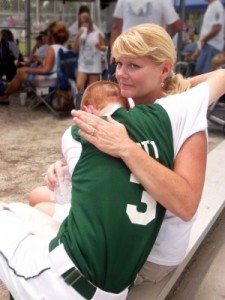 For sports kids, maintaining confidence after a loss is always a big challenge. Athletes tend to be critical of their performance when they lose the game or don’t play up to their own expectations.
For sports kids, maintaining confidence after a loss is always a big challenge. Athletes tend to be critical of their performance when they lose the game or don’t play up to their own expectations.
Parents can sometimes add “insult to injury” when they pick up on mistakes, get frustrated with their athletes’ performance, or unknowingly punish kids with the silent treatment. As a sports parent, it’s important to understand the mental game challenges athletes face after a loss.
Here are the top five tips for being supportive after a loss:
1. The goal is to help your athletes maintain confidence or improve confidence after each performance. Focus on what they are doing well instead of harping on mistakes.
2. Pick out two things about your kids’ performance that you can compliment them on–even if they lost the game. For example, you might say, “You looked really good on the jumps today.”
3. Your young kids can get very emotional after a loss. They might be frustrated, angry, upset and down about the loss. We recommend a cool off period of at least 30 minutes that will allow everybody’s emotions to return to normal. Don’t try to talk to your kids about games during this time. Kids will be more open to talking later when they are less upset.
4. Your kids’ losses are not the end of the world. Remind your athletes that this is one game out of many games they will play in their sports careers. They will always have another chance to play. Help your athletes put the game in perspective.
5. Make sure your athletes understand no one is judging them or perceiving them as bad or weak people. Sports kids tend to equate self-worth with success in sports. You want to communicate to your kids that they are still good people on the inside if they lose or play poorly.
As a sports parent, you have to keep your own expectations in check about your child’s performance. Kids often get upset after losing because they feel they are disappointing or letting you down. No one can be perfect; no one can win all the time. Be careful that you don’t place high expectations on your children about the results you want them to obtain.
Check out The Ultimate Sports Parent workbook for more sports parenting tips.

























